joy


I THOUGHT I understood “joy is an act of resistance” — a phrase first coined by poet Toi Derricotte — like the back of my hand. As someone who is neurodivergent and queer, my existence is political, and my thriving is defiant. Every joke I make, in particular my bad jokes, I make with a wink at all my haters. (The moral arc of the universe bends away from you and toward my bad jokes.)
That, surely, is joy as resistance — being ridiculous when many would rather I be dead. I feel this in my bones. Surely, I thought as I sat down to write this month’s column, I understand this concept well enough to teach my beloved readers how to achieve it in their own lives.
Friends, it turns out I do not actually feel this in my bones. It would be an understatement to say I struggled to write this column. I had to journal about it, talk it out with friends, and take a good long look at myself in the mirror to get to the heart (or the bones, I guess) of the problem, which was, surprisingly, a lack of feeling. A lack of bones? This metaphor is getting away from me.

THE EASTER SEASON provokes a desire in me to find hope and joy again. I don’t want to wallow in misery just because my limited vision can see only a bleak future. Instead, I am choosing to seek hope and joy because I believe that God does indeed empower and guide us. I claim the daily practice of putting my hope in the divine, not our human condition. God seeks our well-being. We must remember this amid the onslaught of trauma brought on by humanity failing to do the right thing.
The post-Easter reflections are more positive in tone. I chose to be optimistic because life goes on, we still have good work to do, and the fight does not end. We still have to care for one another, and we hope that others will care for us. In all of these, I hope that we will find once again the power of prayer and divine love. There are resources we can seek for help, guidance, and support, and I am one of many who have received such generosity and kindness. I invite you to find your own versions of the divine and/or the mystical. The immaterial and unseen surround us, guiding us, especially in our moments of despair and need.
I end my reflection with a prayer for people and nations that are going through turmoil and upheaval. Join me in offering a prayer that we may bring peace wherever we can.
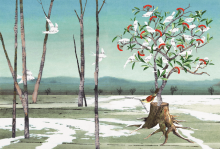
Many of us have made homes in religious traditions where we have found collective love, care, community-building, and resilience. But so much of what passes as spiritual in the United States — churches who only see their work as therapeutic, prosperity gospel proponents, white evangelical nationalists, New Age movements — is commodification by other means. John warns us against false prophets who, through quick fixes and distorted spiritual comforts, foster division and confusion in the service of lucrative self-aggrandizement.
I am an ordained minister in the Fellowship of Affirming Ministries, and I work as a movement chaplain in Los Angeles. I was trained as a spiritual director, and I have been doing ministry with faith-rooted activists since 2016. My work is informed by my primary training as a medical anthropologist and community researcher. I know that Jesus said that we humans are of more value than many sparrows, but I’ve found that we are a lot like them. We need refuge and sustenance. We need shelter. We need to nest somewhere. But with whom shall we do this for the short and long haul? And where shall we build our nests?
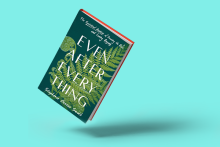
IF YOU WROTE down your past year’s most significant personal joys and losses on a timeline, how might they line up with the liturgical calendar — Advent, Christmas, Epiphany, Lent, Holy Week, Eastertide, and Ordinary Time? Placing these two calendars side by side, what might you find? Stephanie Duncan Smith digs into these questions in her memoir Even After Everything. For Duncan Smith — and likely for most of us — “Sometimes our personal moments converge with these natural and sacred seasons in profound, meaning-rich ways. And sometimes they clash with unbearable disparity.”
Duncan Smith shares her own story of loss and love with unflinching honesty, even and especially where it seems to clash with the Christian story. The places of dissonance are, for her, both a “dizzying problem” and a “place of divine encounter.” She invites us to dive into the dissonance with her as she wrestles out a sort of reconciliation — a renewed understanding of the Christian story that makes room, so much room, for every human grief. “The promise has never been smooth nor safe passage,” Duncan Smith writes. “The divine promise is presence.”

IN HIS BOOK God’s Politics, Jim Wallis tells the story of his trip to South Africa during the apartheid era. During his trip, Wallis attended an ecumenical service at St. George’s Cathedral in Cape Town. While Archbishop Desmond Tutu was preaching, South African police entered the church — carrying recording devices to monitor for any anti-government sentiment — to intimidate the congregation and the anti-apartheid activists. Undeterred, Tutu reportedly continued to preach joyfully, becoming even more passionate in his truth-telling against apartheid. Moments later, the crowd spontaneously erupted in dancing and celebration.
Joy, in the form of dance, may have seemed inappropriate for the moment, but it was really a coded form of resistance and revolution. Even if dancing is not our forte, there is something we can learn from the way the congregation used this subversive, embodied art form.
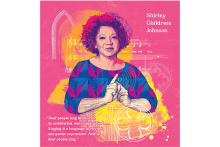
CLIMATE ACTIVIST, GRANDFATHER, and professional cellist John Mark Rozendaal blocked the entrance to Citibank headquarters this summer to protest one of the globe’s biggest funders of fossil fuel expansion. Hugging a fire-engine red instrument, he played a few bars of Bach and was promptly arrested. “The purpose of music is to sober and quiet the mind,” he said to the crowd, “to make it susceptible to Divine influences.” His cello bears the inscription: “This machine loves, serves + protects life.”
Small courageous acts of joy are proliferating. In this issue, Rev. Moya Harris quotes rapper Chuck D to confront troublesome forces in this election season and Chris Crawford, a Catholic at Protect Democracy, urges Christians to become poll workers.
While we mourn the passing of civil rights activist, historian, and song leader Bernice Johnson Reagon, we are grateful for associate editor Josina Guess’ celebration of her life. Reagon’s singular voice demanded that we remember our freedom saints, of whom she is now one. Liz Cooledge Jenkins, reflecting on burnout and social activism, reminds us: “Joy, it turns out, is essential to the work of justice.”

“To live fully and authentically.” It’s a phrase that resonates for me as someone who came into their queerness later in life. For a long time, the possibility of living fully and authentically felt just beyond my reach; I felt I was skimming the surface of my being and longed to be fully immersed — soaked and drenched — in who I am. But I was afraid. What would living authentically mean for my place in the world? As a second-generation Korean American who has long struggled to be seen and accepted, I wondered if being queer would foreclose this possibility.
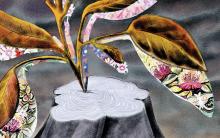
A FEW YEARS ago, I set out to knit a baby blanket as an Advent prayer practice. Knitting is incredibly meditative and allows me to pray with focus and clarity. Knitting a baby blanket seems appropriate as the church awaits the arrival of the “newborn king.” I wish I could say I finished the blanket in time for Christmas. I did not. However, even that seems appropriate, as so much remains unresolved for Jesus’ community at his birth. Their political occupation continued, and even Jesus’ birth story reflects the impositions placed upon his family by the Roman Empire. God’s inbreaking happens under serious duress — but it happens nonetheless.
My favorite lines from the poem “Christmas is Waiting to be Born” by Howard Thurman are: “Where fear companions each day’s life, / And Perfect Love seems long delayed. / CHRISTMAS IS WAITING TO BE BORN: / In you, in me, in all [hu]mankind.”
Thurman reminds us that God was born into our sorrow and among those who are brokenhearted and struggling. That truth is so important to hold on to as we process years of our own collective trauma. No matter how unresolved things are, Christmas is born in us, too! In December we continue our journey through Advent and arrive at Christmas. We might not have received what we’re waiting for by that time, and very little may make sense. Yet, because of who God is, we open our hearts to the improbable, trusting that we won’t be put to shame.

“We are hungry for renewal,” Valarie Kaur wrote in the January 2021 issue of Sojourners. “Sound government is necessary but not sufficient to heal and transition America. Only we the people can bring our communities together, tend to our wounds, and do the labor of reckoning, reimagining, and remaking our nation, block by block, heart to heart.”

I’ve been undoing this cycle for years now, grasping for whatever bits of myself I could salvage and building a whole woman with these fragments, gently weaving them together with truth, with pride, with love, and with hope that I now know. Because for all the ways America has taught me shame and taught me to hide, the people of America have taught me hope. That hope has filled in my gaps.
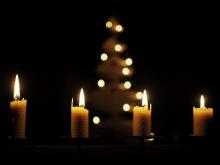
The dimming of the Advent wreath also reminded me of civil rights activist Valarie Kaur’s poignant question: “What if this darkness is not the darkness of the tomb, but the darkness of the womb?” “Remember the wisdom of the midwife: ‘Breathe,’" she says.

IN MY FIRST week of design school, I found myself riding Austin’s notoriously limited public transit system, asking fellow riders why they used it, what would encourage them to ride more often, and what they would change about the service.
After a handful of interviews, my rides yielded an unexpected insight: Users didn’t like Capital Metro’s expanded hours and new bus routes. The changes, implemented in June, were ostensibly for the riders’ benefit. But people’s routine included a strong aversion to change. And for a population already dealing with a rapid rate of change in their city, the new routes were especially disorienting.
Any externally forced change can represent an existential threat—as we know all too well from our daily news cycles. Even something as small as the sudden restructuring of our—or our kids’—commute can throw our perceptions of relational, financial, or political safety into jeopardy.
We’re in a wearying time. And looking at CapMetro users’ responses, I began to wonder whether we can build levity into a daily commute as a form of comfort blanket for these users. How can we offer delight as an antidote to people who are really, really weary of change?

Losing a loved one to murder is unlike any other type of loss. Not only are we robbed of that person and of what could have been, we are robbed of peace, forever haunted by how our loved ones died. There is a level of brutality and fear that comes with homicide. When someone is sick, we can understand the illness and we usually have time to process and say goodbye. But homicide comes with so many questions and finding answers becomes a full-time job.

Hermits exist in many of the world’s major religious traditions: They are individuals who choose temporary or permanent solitude in remote and isolated locations, such as mountains, caves and deserts. These locations are frequently depicted as sites for revelation and transformation.

Self-care is important. If we lose our enthusiasm and start going through the motions, we’re not much good to anyone — including ourselves. Our love is diminished when we lose our sense of connectedness to the source of love, awe, and wonder. Our lives are diminished, too.

I arise in the morning torn between a desire to improve the world and a desire to enjoy the world. This makes it hard to plan the day. — E.B. White
ON A GORGEOUS FALL DAY, I bundle up just a bit and go sit on the rock under the apple tree in the middle of the field. The low-angled sun pours its subdued warmth onto the splashy orange of the maples, transient yellows of the tamarack, and faithfully green cedar. Further to the west, the mountains cut a postcard-perfect silhouette against the seasonally pale blue sky.
Such grace, warming my heart with joy.
A loving God calls us to experience such profligate joy. Now, in the latter decades of my life, time picks up its pace at an alarming rate. So I often promise myself to seek more opportunities to sit on rocks.
But instead, each morning, the genes of my activist mother, the teachings of my faith, and probably a bit too much of my own hubris conspire to bring on the conflicting desire to “improve” (well, okay ... save) the world.
So I strongly identify with E.B. White’s dilemma, softened by his gentle humor-with-a-touch-of-wistfulness.
Working for social justice seems like forever. I am weary of being tedious to those around me who do not understand my seemingly quixotic campaigns. I am weary listening to the current loud, vicious, largely irrelevant public clamor surrounding issues to which I am dedicated. I am weary knowing that those of us preaching minority positions that were once slammed as unrealistic have been proven right. But it took so long: civil rights, the Vietnam War, apartheid, climate change. As we slogged through our protests and The Powers That Be didn’t listen, lives were lost, billions of dollars spent, time wasted. I am impatient: Why can’t the arc of the moral universe run, rather than just bend, toward justice?
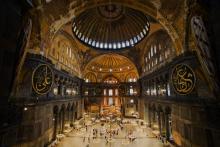
I RECENTLY MADE the mistake of taking an extended trip to my favorite city. Istanbul is a rambunctious sprawl of cultures and histories—catnip for a writer, as I am, and for a college student, as I was on my first visit nine years ago.
Chief among Istanbul’s delights is the Hagia Sophia, first basilica, then mosque, then museum—part architectural wonder, part historical jigsaw puzzle. Above the ochre-domed great hall is the famous juxtaposition: a gilded mosaic of Mary and the Christ Child flanked by two enormous placards in Arabic script—the names Allah and Muhammad. The effect is somehow both solemn and conspiratorial, as if some divine negotiation has happened behind the scenes.
Hagia Sophia means “holy wisdom,” and to enter into its hushed halls, a thin winter light stretching its way across 1,500-year-old pillars to twinkle through heavy chandeliers, is to enter a palpable mystery. It is constitutionally impossible to behold the Hagia Sophia for the first time and not feel a stirring in the soul.
But this was my second time. After eight years of living in Washington, D.C., and working for social justice, I was carrying with me a very different posture toward the world—a suspicion of appearances, a stubbornness to accept grand narrative. I have learned much more about the world and the many ways it fails us since my first glimpse of a shimmering Istanbul. I’ve written about systems that rely on marginalization and the politically convenient, and I’ve felt, deeply and insistently, all the ways the world has grown more threatening for the most vulnerable.

The phrase has captivated my imagination for some time now, as I seek joy in the midst of a world crying out in pain. In a nation of mass shootings and executions, in a world devastated by war crimes and the crime of war, where working for peace means learning the depths and pervasiveness of violence, despair threatens to seep in through the air I breathe. Hope often evades my grasp, and fear like a weight drags down my every movement.
But when I find myself in a morass of bitterness, my soul gets a jolt of energy from my laughing toddler, or the accidentally insightful comment from my precocious 6-year-old, or the warm hand of my husband on my shoulder. I savor the comfort of these gestures and let them lift me out of my cynicism. And as the tears clouding my vision disperse, I remind myself that joy, too, permeates the world and can be found by those with eyes to see it.

We think it's wrong for a woman, much less a mother, to be angry. And so when anger inevitably, righteously, hits us — with its cousin fatigue and its brother frustration — we don't know what to do except to bury it beneath a smile that gets thinner and weaker as the day winds on.
We all get angry, though. It is a function of being human, and I daresay without anger we would never have won women the right to vote, school desegregation, or any other host of advances that came about when people got righteously angry and unleashed the power of justice and the Holy Spirit.
So be angry when you are angry. The Bible says so. Do not be ashamed to say, in the moment, "This is not right. I'm angry."